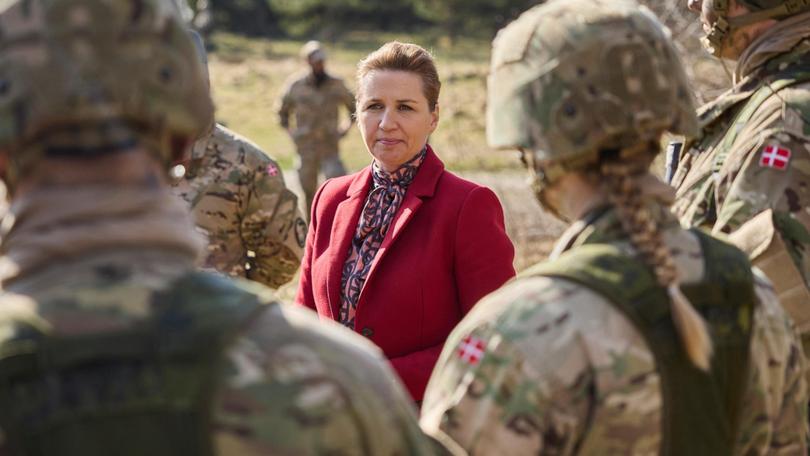BILL SHORTEN: Why Denmark’s plan for female conscription has implications for us all

Living in Australia, we can feel removed from much of what is going on in the rest of the world.
Have people heard about the New Orleans police department where rats are getting high because they’re eating through confiscated marijuana?
Was the 30-minute delay to the Women’s Soccer League match between Chelsea and Arsenal because both teams turned up in white socks a topic of conversation at work?
Sign up to The Nightly's newsletters.
Get the first look at the digital newspaper, curated daily stories and breaking headlines delivered to your inbox.
By continuing you agree to our Terms and Privacy Policy.And did we even know that there is a boom in sausage vending machines in Germany because of around-the-clock demand from citizens for bratwurst and bockwurst?
Goodness knows the internet and social media bombard us with information that can overwhelm even the biggest news fanatic who can be frustrated by the fluff and filler.
But we cannot become so fatigued by the trend that “everything is content” and the torrent of current affairs and the accompanying commentary, that it stops us from being discerning consumers of news.
There are reports that may not appear earth-shattering at first glance, but which are indicative of a bigger story.
One such article that caught my attention this week is that Denmark announced plans to conscript women for military service.
This is a pretty rare move. Denmark is just the third European country to introduce female conscription, Norway and Sweden being the other two.
Danish women can already volunteer for military service and in 2023 made up about a quarter of members of the armed forces.
With the end of the Cold War in the late 1980s and early Nineties, when the Berlin Wall came down and the Soviet Union dissolved into separate republics, we entered a period of relative peace in the world.
Denmark felt secure enough in this new reality to scale back its military capabilities.
But Danish Prime Minister Mette Frederiksen, says Europe’s security climate is changing. Expanding conscription is in response.
“We are not re-arming because we want war, destruction, or suffering. We are re-arming right now to avoid war, and in a world where the international order is being challenged,” Prime Minister Frederiksen said in a press conference.
That is something we should all take notice of.
The Danish Prime Minister may not have specifically mentioned the Russian invasion of Ukraine, but its deadly presence looms large in the thoughts of European governments.
It has also brought the North Atlantic Treaty Organization to the front of our minds.
It is worth a refresher on NATO to understand its importance and the need for its ongoing existence.
NATO was founded in the aftermath of World War II. The Europe we think of today — culturally and economically advanced — makes it is hard to imagine the devastation it had to come back from after six years of conflict.
To give some perspective, approximately 36.5 million Europeans died in the war, more than half of them civilians; refugee camps and rationing were a fact of life; and in the German city of Hamburg alone, half a million people were homeless.
The United States was a founding member of NATO and provided financial aid through the Marshall Plan, which was also known as the European Recovery Program.
This commitment by the US reinforced the belief that a strong and united Europe was key to global stability.
The North Atlantic Treaty was signed in 1949 by the new group of allies and Article 5 of that document agreed “an armed attack against one or more of them… shall be considered an attack against them all”.
This has only been invoked once, after the 9/11 attacks on the US.
There are 32 NATO members. The most recent, Sweden, was added just weeks ago.
When Sweden’s flag was raised for the first time at NATO Headquarters, the Secretary General, Jens Stoltenberg, said that Sweden had taken its rightful place at the table. The Secretary General continued: “Every nation has the right to choose its own path, and we all choose the path of freedom and democracy”.
The people of Ukraine, led by President Volodymyr Zelensky, are in a life and death struggle for their freedom and democracy.
Australia stands with the brave Ukrainian men and women for the same reason the US remains a staunch supporter of NATO and its European allies — what happens in a distant location also has relevance around the world.
Ukrainians might be fighting for their country and their freedom from a brutal, murderous aggressor, but they also fight for us.
If Ukraine fails, other democracies will be weakened.
If Ukraine falls, other autocrats will be emboldened.
And as French President Emmanuel Macron said: “there can be no lasting peace without Ukraine regaining its sovereignty and internationally recognised borders, including Crimea”.
This is the struggle.
Two years on since Russia’s full-scale invasion of Ukraine, Australia remains steadfast in support of our Ukrainian friends.
The Albanese Government, led by Minister for Foreign Affairs, Penny Wong, and Minister for Defence, Richard Marles, recently announced a $50 million grant to the International Fund for Ukraine. This takes our overall support of Ukraine to $960 million, of which $780 million is military assistance.
Australia remains one of the largest non-NATO contributors of military assistance to Ukraine, and proudly so. The people of Ukraine did not seek this war and have displayed extraordinary strength and courage to try to stop it.
Don’t allow the white noise of social media and the misinformation of Russian apologists to distract you from what is happening.
This is a news story we must not look away from.
